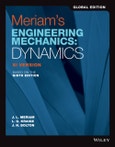Known for its accuracy, clarity, and dependability, Meriam, Kraige, and Bolton's Engineering Mechanics: Dynamics, 9th Edition has provided a solid foundation of mechanics principles for more than 60 years. This text continues to help students develop their problem-solving skills with an extensive variety of engaging problems related to engineering design. In addition to new homework problems, the text includes a number of helpful sample problems. To help students build necessary visualization and problem-solving skills, the text strongly emphasizes drawing free-body diagrams, one of the most important skills needed to solve mechanics problems.
Table of Contents
Part I Dynamics of Particles 1
1 Introduction to Dynamics 3
1/1 History and Modern Applications 3
1/2 Basic Concepts 4
1/3 Newton’s Laws 5
1/4 Units 6
1/5 Gravitation 7
1/6 Dimensions 10
1/7 Solving Problems in Dynamics 11
1/8 Chapter Review 13
2 Kinematics of Particles 16
2/1 Introduction 16
2/2 Rectilinear Motion 17
2/3 Plane Curvilinear Motion 25
2/4 Rectangular Coordinates (x-y) 27
2/5 Normal and Tangential Coordinates (n-t) 32
2/6 Polar Coordinates (r-𝜽) 37
2/7 Space Curvilinear Motion 42
2/8 Relative Motion (Translating Axes) 47
2/9 Constrained Motion of Connected Particles 51
2/10 Chapter Review 54
3 Kinetics of Particles 56
3/1 Introduction 56
Section A Force, Mass, and Acceleration 57
3/2 Newton’s Second Law 57
3/3 Equation of Motion and Solution of Problems 60
3/4 Rectilinear Motion 62
3/5 Curvilinear Motion 67
Section B Work and Energy 71
3/6 Work and Kinetic Energy 71
3/7 Potential Energy 81
Section C Impulse and Momentum 87
3/8 Introduction 87
3/9 Linear Impulse and Linear Momentum 87
3/10 Angular Impulse and Angular Momentum 93
Section D Special Applications 99
3/11 Introduction 99
3/12 Impact 99
3/13 Central-Force Motion 105
3/14 Relative Motion 112
3/15 Chapter Review 118
4 Kinetics of Systems of Particles 119
4/1 Introduction 119
4/2 Generalized Newton’s Second Law 120
4/3 Work-Energy 121
4/4 Impulse-Momentum 122
4/5 Conservation of Energy and Momentum 126
4/6 Steady Mass Flow 132
4/7 Variable Mass 138
4/8 Chapter Review 144
Part II Dynamics of Rigid Bodies 145
5 Plane Kinematics of Rigid Bodies 147
5/1 Introduction 147
5/2 Rotation 149
5/3 Absolute Motion 154
5/4 Relative Velocity 158
5/5 Instantaneous Center of Zero Velocity 165
5/6 Relative Acceleration 168
5/7 Motion Relative to Rotating Axes 173
5/8 Chapter Review 183
6 Plane Kinetics of Rigid Bodies 184
6/1 Introduction 184
Section A Force, Mass, and Acceleration 186
6/2 General Equations of Motion 186
6/3 Translation 192
6/4 Fixed-Axis Rotation 196
6/5 General Plane Motion 199
Section B Work and Energy 205
6/6 Work-Energy Relations 205
6/7 Acceleration from Work-Energy; Virtual Work 213
Section C Impulse and Momentum 217
6/8 Impulse-Momentum Equations 217
6/9 Chapter Review 225
7 Introduction to Three-Dimensional Dynamics of Rigid Bodies 226
7/1 Introduction 226
Section A Kinematics 227
7/2 Translation 227
7/3 Fixed-Axis Rotation 227
7/4 Parallel-Plane Motion 228
7/5 Rotation about a Fixed Point 228
7/6 General Motion 234
Section B Kinetics 240
7/7 Angular Momentum 240
7/8 Kinetic Energy 243
7/9 Momentum and Energy Equations of Motion 246
7/10 Parallel-Plane Motion 248
7/11 Gyroscopic Motion: Steady Precession 250
7/12 Chapter Review 259
8 Vibration and Time Response 260
8/1 Introduction 260
8/2 Free Vibration of Particles 261
8/3 Forced Vibration of Particles 270
8/4 Vibration of Rigid Bodies 278
8/5 Energy Methods 282
8/6 Chapter Review 286
Appendix A Area Moments of Inertia 287
Appendix B Mass Moments of Inertia 288
B/1 Mass Moments of Inertia about an Axis 288
B/2 Products of Inertia 296
Appendix C Selected Topics of Mathematics 302
C/1 Introduction 302
C/2 Plane Geometry 302
C/3 Solid Geometry 303
C/4 Algebra 303
C/5 Analytic Geometry 304
C/6 Trigonometry 304
C/7 Vector Operations 305
C/8 Series 308
C/9 Derivatives 308
C/10 Integrals 309
C/11 Newton’s Method for Solving Intractable Equations 312
C/12 Selected Techniques for Numerical Integration 314
Appendix D Useful Tables 317
Table D/1 Physical Properties 317
Table D/2 Solar System Constants 318
Table D/3 Properties of Plane Figures 319
Table D/4 Properties of Homogeneous Solids 321
Table D/5 Conversion Factors; SI Units 325
Problems P-1
Index I-1
Problem Answers PA-1








